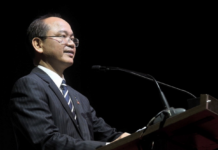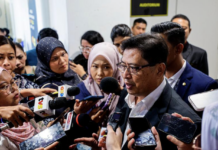KUALA LUMPUR, Oct 5 – Izzudin (not his real name), who joined a religious school in Kedah as an interim teacher in 2017, had to wait for almost a year-and-a-half before he was called to attend an interview for a permanent teaching post.
Like Izzudin, 27, there are many graduates nationwide who are working as temporary teachers in government schools and have been waiting for a long time for their permanent DG41 teaching post.
Since these interim teachers have a basic bachelor’s degree in various fields other than education, they are required to undergo an 18-month diploma in teaching programme conducted during the school holidays (Program Diploma Perguruan Malaysia-Kursus Dalam Cuti) in order to qualify for a permanent post.
But even after completing the postgraduate course, they still have to wait for over a year before being called for an interview by the Education Service Commission (ESC) for a permanent post.
Last month, in a report carried by a Chinese language news portal, a group of interim teachers who qualified under the holiday training programme said 60 to 70 of them were serving as temporary teachers at Chinese schools and another 100 at national primary schools.
The group said they graduated from the programme in August 2019 and have been waiting for more than a year to get a call for an interview from ESC. They urged the Ministry of Education (MOE) to expedite the process of appointing them as permanent teachers to address the shortage of teachers in Chinese schools.
Commenting on this issue, Deputy Education Minister Datuk Dr Mah Hang Soon was reported as saying that he would get in touch with the Ministry of Human Resources and ESC to discuss the matter further and fix their interview schedule.
Malaysian Muslim Teachers Association (iGuru) president Mohd Azizee Hasan described the issue as a long-standing one and he urged the interim teachers to “wait patiently” for their turn to be called for an interview by ESC for the DG41 post.
“It’s important to understand that this issue faced by interim teachers (who have completed the holiday diploma in education course) is just a part of a bigger issue, which is the deluge of fresh graduates who graduated with a bachelor’s degree in education from teacher training institutions and public universities nationwide.
“Many of them, especially graduates from public universities, are still waiting for ESC to call them for an interview for a teaching post,” he said.
Hoping that the MOE and ESC would find a speedy solution to this issue, Mohd Azizee said some of them have been waiting for more than two years to be called for an interview for a posting.
According to a 2018 survey report by the Public University Education Graduates Movement, out of the 3, 802 respondents (education graduates) covered by its survey, 1,738 were still waiting for ESC to call them for an interview.
In February this year, the then Deputy Education Minister Teo Nie Ching had said that there were 5,628 vacancies for permanent posts at national schools and 1,125 vacancies in Chinese schools. She said 2,482 teachers have already been appointed to fill the vacancies in national schools and 480 in Chinese schools.
Mohd Azizee said based on data obtained from the National Union of Teaching Profession and ESC’s website, there were 28,401 applicants for permanent teaching posts in government schools as of 2018. Out of that number, 5,549 have been called for interviews and 3,115 have succeeded in securing permanent placements.
“So, you can imagine how many more education graduates are still waiting for ESC to call them for an interview and to be absorbed into the DG41 or DG29 post,” he said.
According to the ESC website, to be qualified for the DG29 grade, the candidate must possess at least a diploma in teaching from a local teacher training institute, or equivalent qualifications.
For the DG41 grade, the candidate must have a bachelor’s degree in related fields recognised by the government from a public university as well as a diploma in education, or equivalent qualifications.
It is only natural for temporary or interim teachers to want to be absorbed as permanent teachers as soon as possible so that they can have access to all the perks, including promotion and pension, enjoyed by permanent civil service staff.
Reiterating his call to the interim teachers to remain patient and continue teaching, Mohd Azizee hoped that MOE and ESC would “leave no one behind in its efforts to absorb all of them as permanent teachers after they are interviewed”.
Mohd Azizee also suggested that MOE and public universities look into doing away with education degree programmes that are not very relevant to the current education landscape.
“For example, we don’t need that many teachers to teach subjects such as geography.
“Instead, public universities should focus on producing more education graduates specialising in science, technology, engineering and mathematics (STEM),” he said.
Having more teachers specialising in STEM will go a long way in preparing Malaysian students to embrace the Industrial Revolution 4.0 era, as well as meeting the nation’s needs for a more skilled workforce.
Mohd Azizee also said that Malaysia should reduce the teacher-student ratio from the current average of 1 to 35-40 to 1 to 20-25.
The United Nations Education, Scientific and Cultural Organisation’s (UNESCO) recommended teacher-student ratio is one to 15.
“In our country, the ratio should be one teacher to 20 to 25 students. This will facilitate the teaching and learning process. Teaching smaller classes will make it easier for the teacher to focus on each and every student,” he added.
















